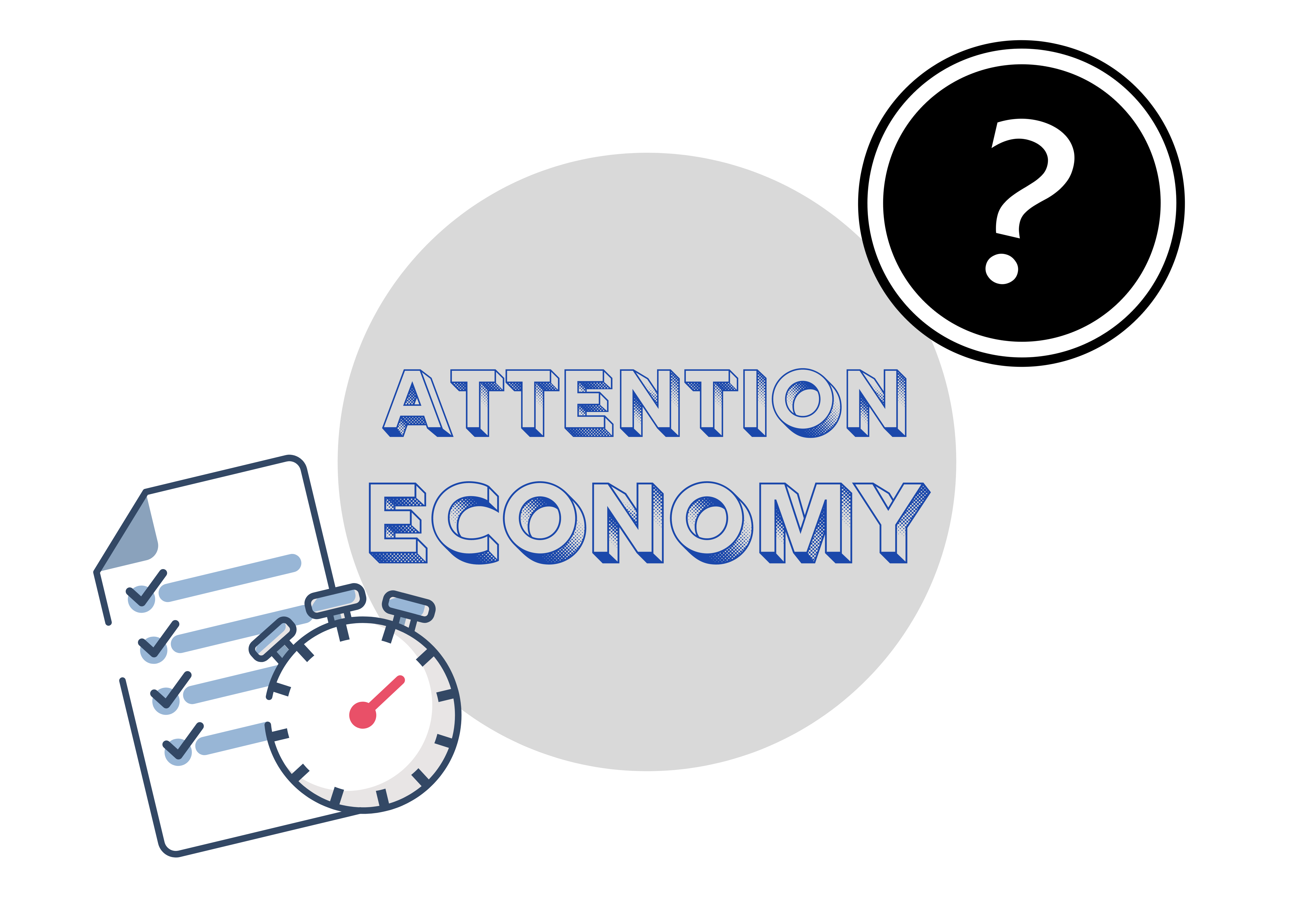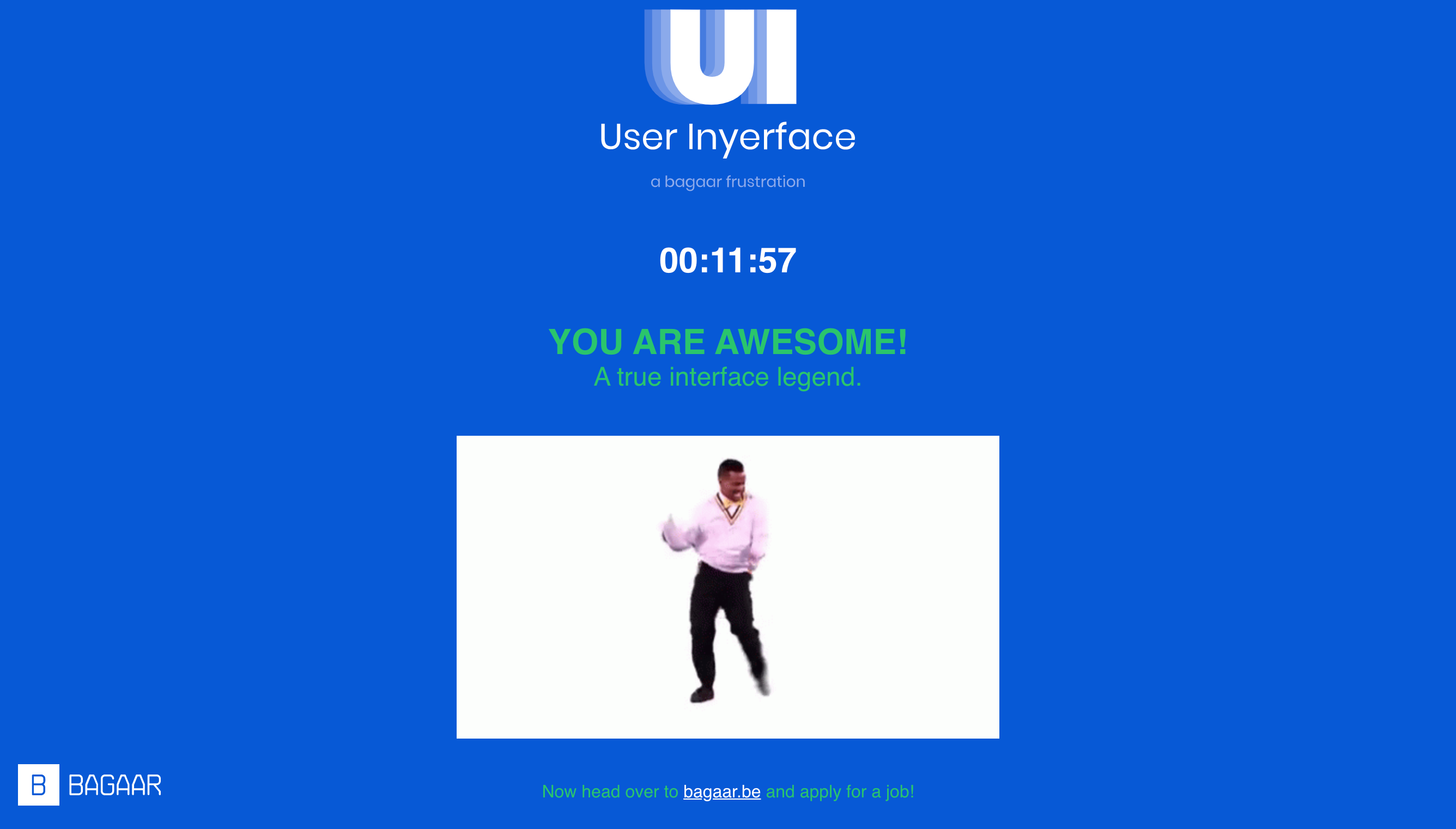Task 10: Attention Economy
In one word, this task was: distressing! I have played a few games before designed to “confuse” you and it still took me a while to get past the first “task” set out by GUI. The clock added this sense of impending doom, even if it quite literally tells you the time is ticking, but not running out. Which, I now realize was purposeful to veer or divide your attention; or as Harris describes in his Ted Talk, to keep you on a page longer (2017). Much of this GUI seemed to be developed in that sense; to allure, distract and withhold a user, all in one place.
I thought my initial engagement with the GUI went well, clicking the word “here” instead of clicking “No”. I found myself stuck on that first page for a while because I needed to stop and read the instructions. I had spent some time clicking the help box to see if there were clues. It forces you to be conscious about reading instructions to completion; something I am sure many of us are guilty of when “agreeing to the terms” in any online agreement.
Which brought me to the next task – accepting the terms and conditions. I had scrolled through, although I proudly I realized fairly quickly that there were going to be hidden instructions; I had read about that somewhere else, where rules or clues are hidden in the terms and conditions section. I felt that sense of pride is also something developers and designers play on when creating these attention economies. Much like a video game, they, in a sense, scaffold what you achieve in order to help you gain skill and go further to more challenging tasks (Fullerton, 2014). This may have been created in a similar vein. Even if the timer did not mean anything, progressing from the current task to the next, you felt that sense of accomplishment due to the “racing against the clock” environment. Thankfully for this task, the hidden clue, was close to the top.
During the next task, I started to put my real, personal information but I was suddenly conscious of “big brother” and putting all my real personal information in a random game, that I started to put only half truths. I dawned on me that I did not need to put my real information, as long as it was accurate to the rest of the information – such as matching my birth year to the age. That must be how GUI and attention economy developers bait real people; as opposed to bots, when designing these environments. Much like the weighed nodes on the web (Code.org, 2017), certain information has to be “accurate”, for a whole group to find what they need. One other aspect that took me some time to realize was my gender not matching with my title. I had the wrong one highlighted, usually if a box is “coloured in”, you have selected it, but for that particular function it was opposite. Another play on what is “universally” accepted when it comes to online forms.
The last section, the “make sure you’re human”/CAPTCHA section was tedious and I wanted to make sure that I had not missed a “select all” function; which I did try to find. It was interesting that the page was purposefully scrolled down, so you do not realize which box you are ticking, matches to the picture. One thing I recognized through this task, is that I am better at language than I thought. I distinctly recall reading the words, then saying to myself “Oh obviously, it’s all meanings and definitions of the word”. Although the general nature of the GUI still stirred suspicion; if it had to be the whole word itself or iterations of the word; such as “check”, showing the checkered pattern but it was a variation on the word itself. I also spell money “checks” as “cheque”, which caused me to stop and think about what was accepted in this economy versus what was accepted universally.
By the time I got to the end I did not believe it and still clicked around to make sure; clicking the “Homepage” of the creators to make sure it was simply “Homepage” and not another challenge. As previously mentioned, it had become second nature of the economy to be skeptical. I conjecture that developers use this distrust as well, to lure people in. They must keep a database and consistently do research to see what looks questionable; to avoid that appearance. That feeling of immediacy and distrust remained at this last page; even though it was not counting down, I was “competing”, and just with myself.
Throughout my entire engagement with the GUI, I did not know what the prize, was yet I hurriedly carried on. Even if the opening page tells you to complete it quickly and accurate as possible, it does not mention any consequence. One example of there being an immediate consequence on online forums such as these, is purchasing something; such as concert tickets, buying an item with few left in stock or catching the sale. If you do not complete your information or transaction within that time frame – or the clock – you instantly lose out on that deal. This sense of imminence is truly what the GUI plays on and it was thrilling and stressful to say the least. While reading instructions was not my strong suit when trying to “beat the game”, I was impressed at my ability to decode and work through the tasks.
References
Code.org. (2017, June 13). The Internet: How Search Works
. Retrieved from
Fullerton, T. (2014). Game Design Workshop: A Playcentric Approach to Creating
Innovation Games, NY: Taylor & Francis (CRS Press)
Harris, T. (2017). How a handful of tech companies control billions of minds every day.
Retrieved from
https://www.ted.com/talks/tristan_harris_the_manipulative_tricks_tech_compan
es_use_to_capture_your_attention?language=en (Links to an external site.)
Systems Innovation. (2015, April 18). Graph Theory Overview
. Retrieved from
Systems Innovation. (2015, April 19). Network Connections
. Retrieved from
on



Hi Clarissa!
I also did a similar thing to you when putting in my information. I didn’t want to put in completely true info because of “big brother.” My thoughts were that for this site, I didn’t need it to know actual things about me because I wouldn’t use it to identify myself. Unlike Google, Facebook, or Instagram (which I use to connect with friends), this website didn’t require me to have my actual info. Whenever possible, I do not like to provide accurate info because I do not know what the data is going to be used for.
Hi Clarissa
I like your analysis of the game and how you described your process through it. Like you, I found it frustrating at times, but I like puzzle games such as this one, and as I said in my report, it reminded me of an escape room game.
I also was very leery of entering my real information, and I quickly gathered that entering the real info wasn’t important, the main point was just making the connections to how the data was being collected, and the intended misdirections. One thing that is making me increasingly uncomfortable is how much of my data is collected and stored, and how one can’t avoid entering personal data to access desired sites or online resources, and then how your data is sold to telemarketers and scammers.
One thing I’ve been doing is entering a ‘buffer email’ that I check perhaps a couple of times per year. This allows me to access the sites/resources without them bothering me with spam. I also enter a fake birthdate (same year but different month and day).
Data mining is so insidious. An example is those silly quizzes that you see on Facebook. Do enough of those and Facebook has a total profile of you. Google does the same thing – tracking your GPS on your phone and keeping track of where you shop, where you work, etc. I try to shut off as much of Google tracking as I can, but then if you shut off too many things, then you limit the features that you actually want. My question is… is the sacrifice of our privacy worth the conveniences we have gained?
Hi Clarissa,
I enjoyed reading the detailed account of your experience with the “game.” I also typed in fake information when it asked for my personal data. I grew up in the 90s, before computers and the Internet became mainstream, so I thought it was interesting that my father was quite vigilant reminding me and my siblings to not wear clothes or accessories with our names emblazoned on them or to share our birthdays and birth time unnecessarily because it can be used by the occult. I can’t help but think how our personal information has been important through the years, just for different reasons. With an activity like this task, it’s amazing all the techniques companies and organizations can use to gather our personal information. Now a name and birthday can be used to gain much more information than before.